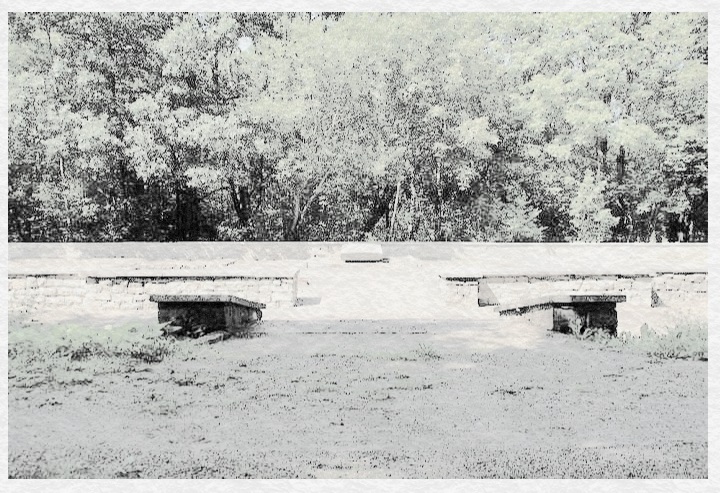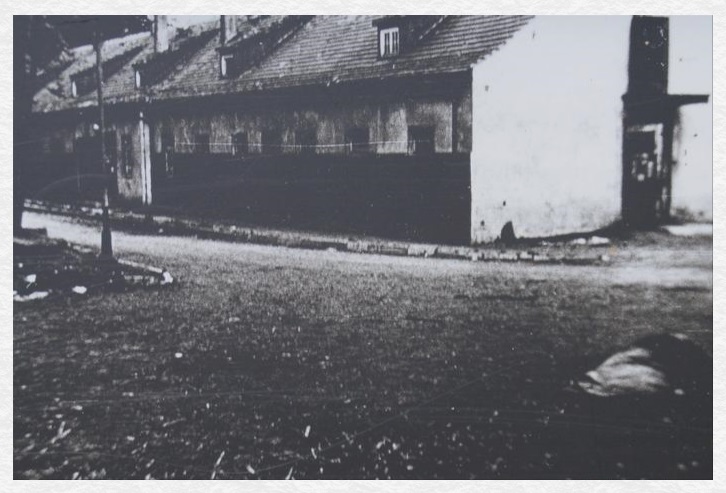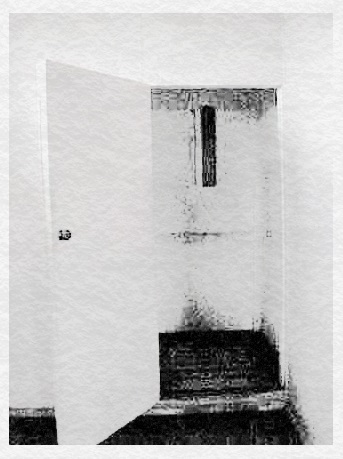Stables & Riding Academy: Difference between revisions
No edit summary |
No edit summary |
||
| (One intermediate revision by the same user not shown) | |||
| Line 1: | Line 1: | ||
;'''[[Buchenwald concentration camp]]''' | ;'''[[Buchenwald concentration camp]]''' | ||
'''''The pigs in the SS stables received better feed, compared to the food of the prisoners.'''''<br> | '''''The pigs in the SS stables received better feed, compared to the food of the prisoners.'''''<br> | ||
— Peter Zenkl, former Buchenwald inmate, ''Testimony in the Buchenwald Trial from mid April 1947''.<br> | — Peter Zenkl, former Buchenwald inmate, ''Testimony in the Buchenwald Trial from mid April 1947''. | ||
<br> | |||
<br> | |||
[[File:Remains of the Buchenwald Stable Block.jpg]] | [[File:Remains of the Buchenwald Stable Block.jpg]] | ||
<br> | <br> | ||
The Buchenwald camp guidebook says that 8,000 Soviet Prisoners of War were executed in Buchenwald. They were killed according to the Commissar Order (Kommissarbefehl) issued by the supreme command of the Germany army. These executions under the Commissar order were carried out by a special detachment known as Kommando 99 in Buchenwald.<br> | <span style="color:#696969;"> The Buchenwald camp guidebook says that 8,000 Soviet Prisoners of War were executed in Buchenwald. They were killed according to the Commissar Order (Kommissarbefehl) issued by the supreme command of the Germany army. These executions under the Commissar order were carried out by a special detachment known as Kommando 99 in Buchenwald.<br> | ||
[[File:Buchenwald Stable Block.jpg]] | [[File:Buchenwald Stable Block.jpg]] | ||
<br> | <br> | ||
The execution site was the horse stable, a brick building, 55 meters long, which was next to the Riding Hall where Commandant Koch and his wife Ilse rode their horses indoors, while the SS orchestra played military marches.<br> | <span style="color:#696969;"> The execution site was the horse stable, a brick building, 55 meters long, which was next to the Riding Hall where Commandant Koch and his wife Ilse rode their horses indoors, while the SS orchestra played military marches.<br> | ||
[[File:Buchenwald stable execution booth.jpg]] | [[File:Buchenwald stable execution booth.jpg]] | ||
<br> | <br> | ||
In the horse stable a measuring device of the type used in a doctor's office was put on the wall. A narrow slot in the device allowed the executioner to shoot the prisoner in the neck from a booth behind the wall. According to the guide book "military marches sounded through the building" to drown out the noise of the shots. The dead bodies were removed in large galvanized containers, an example of which is on display in the pathology lab next to the crematorium. | <span style="color:#696969;"> In the horse stable a measuring device of the type used in a doctor's office was put on the wall. A narrow slot in the device allowed the executioner to shoot the prisoner in the neck from a booth behind the wall. According to the guide book "military marches sounded through the building" to drown out the noise of the shots. The dead bodies were removed in large galvanized containers, an example of which is on display in the pathology lab next to the crematorium. | ||
Latest revision as of 12:59, 23 June 2014
The pigs in the SS stables received better feed, compared to the food of the prisoners.
— Peter Zenkl, former Buchenwald inmate, Testimony in the Buchenwald Trial from mid April 1947.

The Buchenwald camp guidebook says that 8,000 Soviet Prisoners of War were executed in Buchenwald. They were killed according to the Commissar Order (Kommissarbefehl) issued by the supreme command of the Germany army. These executions under the Commissar order were carried out by a special detachment known as Kommando 99 in Buchenwald.

The execution site was the horse stable, a brick building, 55 meters long, which was next to the Riding Hall where Commandant Koch and his wife Ilse rode their horses indoors, while the SS orchestra played military marches.

In the horse stable a measuring device of the type used in a doctor's office was put on the wall. A narrow slot in the device allowed the executioner to shoot the prisoner in the neck from a booth behind the wall. According to the guide book "military marches sounded through the building" to drown out the noise of the shots. The dead bodies were removed in large galvanized containers, an example of which is on display in the pathology lab next to the crematorium.